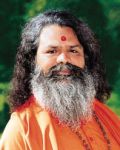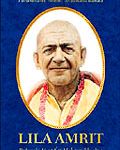The Caste System
During Mahaprabhuji's lifetime the caste system was prevalent in India.
This system was originally developed to prescribe the different roles and duties people had in society. Such roles and duties are the normal requirements in the function of any social order. However, this system was misused to legitimise obvious injustices. The original intention was never to segregate the population into classes from birth, rather to distinguish people according to the activities that they carried out in society.
For example, it is said in The Mahabharata, "If a butcher acts like a brahmin, he is a brahmin and if a brahmin acts like a butcher, so he must be looked upon as a butcher. Therefore give up your vanity and look for the truth in your soul."
In The Bhagavad Gita the human body is symbolically given as an example:
"The head is symbolical for the brahmins, scholars and priests of the land. The kshatriyas or warriors protect the nation, just as the hands protect the body. The vaishyas, merchants and peasants, are compared with the belly of a human and the sudras, or workers, with the feet which carry the whole body wherever it wants to go."
According to law, all Indians have equal rights, but in practice the sudras, or as they were later called, the "untouchables," suffer untold discrimination. Mahaprabhuji did all he could within his power against these injustices and the following incident shows Mahaprabhuji's reaction to the disdainful treatment that was experienced by the members of the lower caste in Indian society.
A farmer from the sudra caste was working in a field on a hot summer's day when, in order to quench his thirst, he sought a water well. The well belonged to a high-caste brahmin family, one of whom had just bathed and was reading a book. The thirsty farmer approached and requested permission to have a drink of water, but the brahmin didn't even bother to answer him.
Three times the farmer repeated his request until the brahmin sneered at him, "Go away, there's no water for you here. You'll make my well impure!"
The farmer moved on and soon came to the mosque of the village, where he addressed the Muslim fakir.
"Please sir, I am thirsty. May I have some water?"
"Son of Allah, help yourself," the friendly Muslim answered. "There's a jug beside the well."
While he was drinking, the farmer thought, "What's the use of being a Hindu if I can expect nothing but rejection from my fellow Hindu brothers?"
So he told the fakir of his experience with the brahmin and expressed the wish to become a Muslim.
The fakir asked the farmer his name.
"I am called Kalu Ram."
"From now on your name shall be Kalu Khan," the fakir said. "Now take this water pot and fill it at the well of the brahmin. If he objects, remember that you own a strong right foot. Go, son of Allah and let's see who can stop you!"
Kalu returned to the water well and wordlessly began to fill the jug.
"Clear off!" the furious brahmin shouted at him. "How dare you dirty my well!"
"What liberties do you take with me?" the farmer shot back. "I'm Kalu Khan, the Muslim!"
And with that he gave the brahmin a swift kick. The proud brahmin flung his book into the air as he tumbled into the sand and the farmer threatened to give him further beatings.
"Spare me!" the brahmin begged, filled with fear. "I didn't know that you had become Kalu Khan. Please forgive my mistake."
News of this incident soon spread throughout the district and came to the ears of Mahaprabhuji. It was the first time that I saw tears in his eyes. He was filled with sadness over the blindness and ignorance of the people of his country.
"They've forgotten the true sense of religion. They're selfish and blind and don't know the meaning of charity. These poor sudras work all day long for a meagre wage and the others only do them wrong. The distinction between high and low caste is a horrible stain on India's karma and the whole country must and does suffer for it."
Mahaprabhuji then set out to do what he could to solve this problem. He called his devotees to a large gathering where all castes came together and he voiced the injustices of the caste system.
With truly Divine power he exposed the error of this discrimination between humans, for humans should meet each other as brother and sister. He spoke of the damage this system, based on wrong assumptions, had created for the inhabitants of all the land. He spoke like a heavenly architect, building brick by brick, word by word, a house of love and understanding in which all could live in peace together.
He then called Kalu Khan and gave him the gift of a sacred thread that brahmins wore.
"My son, you are a human and so possess all rights but if you wish from now on you can be a brahmin."
Turning to his disciples, Mahaprabhuji continued, "This man was first a sudra, then a Muslim and now I declare him a brahmin. Is he the same person he always was, or is he different? As a brahmin he is no closer to God than when he was a sudra and as a Muslim he had no greater knowledge than as a Hindu."
Mahaprabhuji explained further.
"A true brahmin is one who knows Brahman, the brahma-gyani. It is not by birth that one achieves the social position of brahmin but through the realization of brahma-gyana. All humans belong to one caste only and that is humanity. Therefore it is a great ignorance to classify someone according to higher or lower caste. On the contrary, the position of a person depends on his qualities, actions and abilities. One who makes jewellery from silver and gold is known as a goldsmith, one who makes articles of wood is known as a carpenter and one who works with leather is known as a tanner. In the same way only that one is a brahmin who knows Brahma and only that one who protects living beings is a kshatriya (warrior)."
Wherever Mahaprabhuji held satsang he spoke against the caste system, encouraged the sudras to show more self-confidence and taught the brahmins that the circumstances of another's birth have no bearing on purity or impurity, but that these are only dependent on one's thoughts and deeds.
Next Chapter: Mauna Satsang
Previous Chapter: My First Satsang Journey
Overview: My life with Sri Mahaprabhuji








